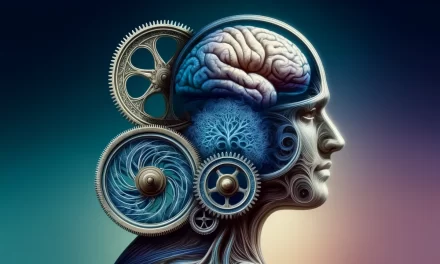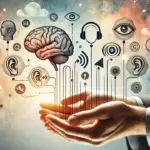Introduction
Welcome to the transformative world of Neuro-Linguistic Programming (NLP), a fascinating approach that blends language, communication, and personal development to foster profound life changes. At its core, NLP is about understanding how we think, communicate, and behave, enabling us to develop life-changing habits and embark on a journey of self-improvement. This blog post is designed to introduce you, whether you’re a student, teacher, professional, coach, or even a housewife, to the basics of NLP and how it can be applied to improve every aspect of your life.
NLP isn’t just a set of theories; it’s a practical toolkit for personal growth. By incorporating NLP techniques into your daily routines, you can begin transforming your life, one habit at a time. This guide aims to demystify NLP for personal development, offering you insights, real-life examples, and actionable strategies to enhance your digital marketing skills as a coach, and to help you navigate your personal and professional life more effectively. Let’s embark on this journey of self-improvement with NLP together!
Understanding NLP and Its Impact on Personal Development
Neuro-Linguistic Programming, commonly known as NLP, is a revolutionary approach that intersects psychology, communication, and behavioral patterns. It operates on the principle that there is an intrinsic connection between neurological processes (“neuro”), language (“linguistic”), and behavioral patterns learned through experience (“programming”). This synergy forms the foundational premise of NLP’s application in personal development.
At its essence, NLP is a toolkit for enhancing personal effectiveness. It helps individuals understand the workings of their mind, enabling them to interpret and reframe their thoughts, emotions, and actions. This understanding is crucial for anyone, especially coaches new to digital marketing, as it aids in developing a robust mindset, essential for navigating the complex digital landscape.
One of the key aspects of NLP is its focus on the power of language and communication. NLP teaches that the words we choose and how we communicate internally (with ourselves) and externally (with others) significantly influence our thoughts and actions. For instance, a coach adopting positive linguistic patterns in their digital content can engage and motivate their audience more effectively. This aspect of NLP ties directly into personal branding and messaging, a vital component in the digital marketing world.
NLP also addresses mindset change, pivotal in personal and professional development. It advocates for a growth mindset, encouraging individuals to view challenges as opportunities for learning and growth. For coaches in the digital realm, this means cultivating resilience, adaptability, and a continuous learning attitude, key traits for success in an ever-evolving digital environment.
Moreover, NLP’s techniques are effective in instilling life-changing habits, essential for personal growth. By understanding and applying NLP strategies, individuals can break free from limiting beliefs, adopt new, constructive behaviors, and set achievable goals. This is especially beneficial for coaches looking to enhance their digital marketing strategies, as it involves consistently evolving and adapting one’s approach to meet the dynamic needs of the digital audience.
In summary, NLP offers invaluable insights and techniques for personal development, particularly for those embarking on a journey in digital marketing. It empowers individuals to harness the power of their mind, language, and behaviors to achieve their full potential, making it a vital tool in the personal and professional development arsenal.
The Power of Habit Formation with NLP
Habit formation is a cornerstone of personal development, and Neuro-Linguistic Programming (NLP) offers a unique perspective on this process. NLP’s approach to habit formation isn’t just about creating new routines; it’s about rewiring the brain to embrace these routines as integral parts of our life. For coaches, particularly those new to the digital marketing sphere, understanding and applying these strategies can lead to more effective practices and successful outcomes.
The first step in NLP’s habit formation strategy involves identifying and understanding limiting beliefs that hinder progress. For example, a coach struggling with regular content creation might hold a belief that they aren’t creative enough. NLP techniques help in reframing this belief, transforming it into a more empowering mindset, such as viewing each attempt at content creation as an opportunity to learn and grow. This shift in perspective is crucial in building the resilience necessary for the dynamic digital marketing landscape.
Another significant aspect of NLP in habit formation is the emphasis on visualization and positive affirmations. Visualization is a powerful NLP tool where individuals are encouraged to imagine themselves successfully performing a new habit. A coach might visualize themselves engaging confidently with their online community, creating a mental blueprint that guides their actions. Coupled with positive affirmations, this practice can reinforce self-belief and motivation.
NLP also advocates for setting clear, achievable goals, a vital step in habit formation. By breaking down larger objectives into smaller, manageable tasks, the process of habit formation becomes less daunting. For a coach venturing into digital marketing, this might mean setting specific weekly goals for social media engagement or content creation, making the task more structured and achievable.
Incorporating NLP techniques for better habits doesn’t stop at personal development. It extends to professional realms, especially in areas like digital marketing, where consistent and engaging habits can significantly influence success. By applying NLP strategies, coaches can not only improve their personal efficacy but also enhance their digital presence, creating a virtuous cycle of growth and success.
NLP Techniques for Everyday Life
Integrating Neuro-Linguistic Programming (NLP) techniques into daily life can be a game-changer, especially for professionals like coaches diving into the digital marketing world. These techniques are not just theoretical concepts but practical tools that can enhance communication, personal effectiveness, and overall well-being.
1. Anchoring for Emotional Regulation:
Anchoring is an NLP technique where a specific emotional state is linked to a physical trigger. For instance, a coach feeling anxious about a live webinar can establish an anchor — like a gentle touch on the wrist — associated with feelings of calm and confidence. Activating this anchor during anxious moments can help bring about the desired emotional state. This technique is invaluable in managing the emotional ups and downs of digital marketing, from handling client feedback to maintaining composure during challenging situations.
2. Reframing for Perspective Shift:
Reframing involves changing the way we perceive an event or experience to alter its meaning and impact on us. For a coach, a negative review can be reframed from a failure to a learning opportunity, shifting focus from self-criticism to growth. This perspective shift is vital in the digital space where feedback is immediate and often public.
3. Modeling for Skill Acquisition:
In NLP, modeling is about replicating the skills, behaviors, and attitudes of those who excel in a particular area. Coaches can use modeling to enhance their digital marketing skills by observing and imitating successful digital marketers. This could involve studying their communication style, content strategy, or audience engagement techniques.
4. Meta-Model for Clear Communication:
The Meta-Model in NLP is a set of questioning techniques that help clarify vague language and assumptions. For coaches, using the Meta-Model can improve client interactions by ensuring clear, precise communication. In digital marketing, this translates to creating content that is straightforward and resonates with the target audience.
5. Mindfulness and Self-Awareness:
Integrating mindfulness with NLP techniques enhances self-awareness and presence. For coaches in digital marketing, this could mean being fully present during client sessions or mindful of their online interactions, leading to more meaningful and effective engagements.
Incorporating these NLP techniques into everyday routines can significantly enhance a coach’s personal and professional life. These strategies not only aid in personal growth but also equip coaches with the skills to navigate the digital marketing landscape more effectively, fostering a holistic approach to success.
Transforming Mindsets and Behaviors through NLP
The transformative power of Neuro-Linguistic Programming (NLP) lies in its ability to reshape mindsets and behaviors, essential for personal and professional success. Coaches, especially those venturing into digital marketing, can harness NLP to navigate this dynamic field with greater confidence and adaptability.
1. Overcoming Limiting Beliefs:
A fundamental aspect of NLP is identifying and altering limiting beliefs that obstruct personal growth and professional advancement. For a coach, beliefs like “I’m not tech-savvy enough for digital marketing” can be debilitating. NLP techniques enable the reprogramming of such thoughts, turning them into empowering beliefs like “I am continuously learning and improving my digital skills.” This mindset change is crucial for embracing the challenges and opportunities of digital marketing.
2. Enhancing Behavioral Flexibility:
NLP stresses the importance of behavioral flexibility — the ability to adapt one’s behavior to suit different situations. In the fast-paced world of digital marketing, coaches need to pivot strategies, experiment with new tools, and adapt to shifting trends. NLP equips individuals with the mental agility to make these adjustments smoothly and effectively.
3. Goal Setting and Achievement:
NLP offers robust frameworks for setting and achieving goals, an invaluable skill for coaches. By employing well-formed outcomes, a key NLP concept, coaches can define clear, specific, and achievable goals for their digital marketing endeavors. This structured approach ensures that goals are aligned with personal values and vision, increasing the likelihood of success.
4. Building Rapport and Effective Communication:
NLP techniques are excellent for enhancing communication skills, vital for successful digital marketing. Understanding and applying principles of rapport building enables coaches to connect more deeply with their audience, whether in writing, video, or live interactions. This connection is key to building trust and engagement online.
5. Stress Management and Resilience Building:
The digital world can be overwhelming, making stress management skills crucial. NLP offers strategies for managing stress and building resilience, enabling coaches to maintain their composure and effectiveness even in high-pressure situations. Techniques like dissociation (stepping back from stressful situations) and resource anchoring (creating mental anchors for positive states) are particularly useful.
Incorporating NLP into their professional toolkit allows coaches to transform not just their mindset but also their approach to digital marketing. By adopting NLP’s principles, they can create more impactful strategies, communicate more effectively with their audience, and navigate the digital landscape with greater resilience and adaptability.
NLP Strategies for Specific Audiences
Neuro-Linguistic Programming (NLP) is not a one-size-fits-all approach; it can be tailored to meet the diverse needs of various individuals, especially in a professional setting. Coaches, who often cater to a wide range of clients, can leverage NLP strategies to enhance their digital marketing efforts, ensuring they address the specific needs and challenges of their audience.
1. For Students and Educators:
Students and educators can benefit from NLP techniques that enhance learning and teaching effectiveness. Strategies like ‘Chunking’ — breaking down information into smaller, manageable units — can aid in both content creation and learning. Coaches targeting this group can use digital platforms to share bite-sized educational content, leveraging NLP to make their teachings more accessible and retainable.
2. For Health Professionals (Doctors, Therapists, Counselors):
NLP offers tools for better communication and empathy, essential in the health sector. Coaches working with health professionals can use NLP to teach them how to build rapport with patients and manage stressful situations more effectively. Digital content focused on empathy-building and stress management techniques can be particularly beneficial for this audience.
3. For Business Professionals and Entrepreneurs:
Business professionals and entrepreneurs often seek ways to improve leadership and communication skills. Coaches can use NLP techniques to help them develop these skills. Strategies like modeling successful business leaders and using well-formed outcomes for goal setting can be shared through webinars, podcasts, and online courses.
4. For Homemakers:
Homemakers can benefit from NLP strategies that aid in time management, goal setting, and personal development. Coaches can create digital content that offers practical NLP tips for managing household tasks more efficiently, balancing personal goals with family responsibilities, and maintaining emotional well-being.
By adapting NLP strategies to meet the needs of these specific groups, coaches can enhance their digital marketing strategies, making their content more relevant and appealing. This tailored approach not only showcases their expertise in NLP but also their ability to understand and address the unique challenges faced by different segments of their audience.
Conclusion
In this journey through the principles and applications of Neuro-Linguistic Programming (NLP), we’ve explored how its techniques can profoundly impact personal and professional development. From understanding the basics of NLP to applying its strategies in various aspects of life, it’s clear that NLP is more than a theoretical concept; it’s a practical toolkit for transformation.
For coaches, particularly those navigating the complexities of digital marketing, NLP offers invaluable resources. By learning to reframe limiting beliefs, enhance communication skills, and adapt behaviors to meet the evolving demands of the digital world, coaches can not only improve their own lives but also bring significant value to their clients. The versatility of NLP, as demonstrated in its applications across different audiences — students, educators, health professionals, business leaders, and homemakers — underscores its relevance in diverse contexts.
Remember, the journey of personal growth and professional mastery is continuous. Integrating NLP into your daily routines and professional practices doesn’t happen overnight. It requires commitment, practice, and a willingness to step out of your comfort zone. Start small, experiment with different techniques, and observe the changes in your mindset, behaviors, and outcomes.
As you incorporate NLP into your life, remember that each step forward is a part of your transformation. Whether it’s improving your digital marketing skills, enhancing your coaching methods, or simply becoming a better version of yourself, NLP is a powerful ally on this path. Embrace the journey with curiosity and openness, and watch as you change your life, one habit at a time, with the magic of NLP.










